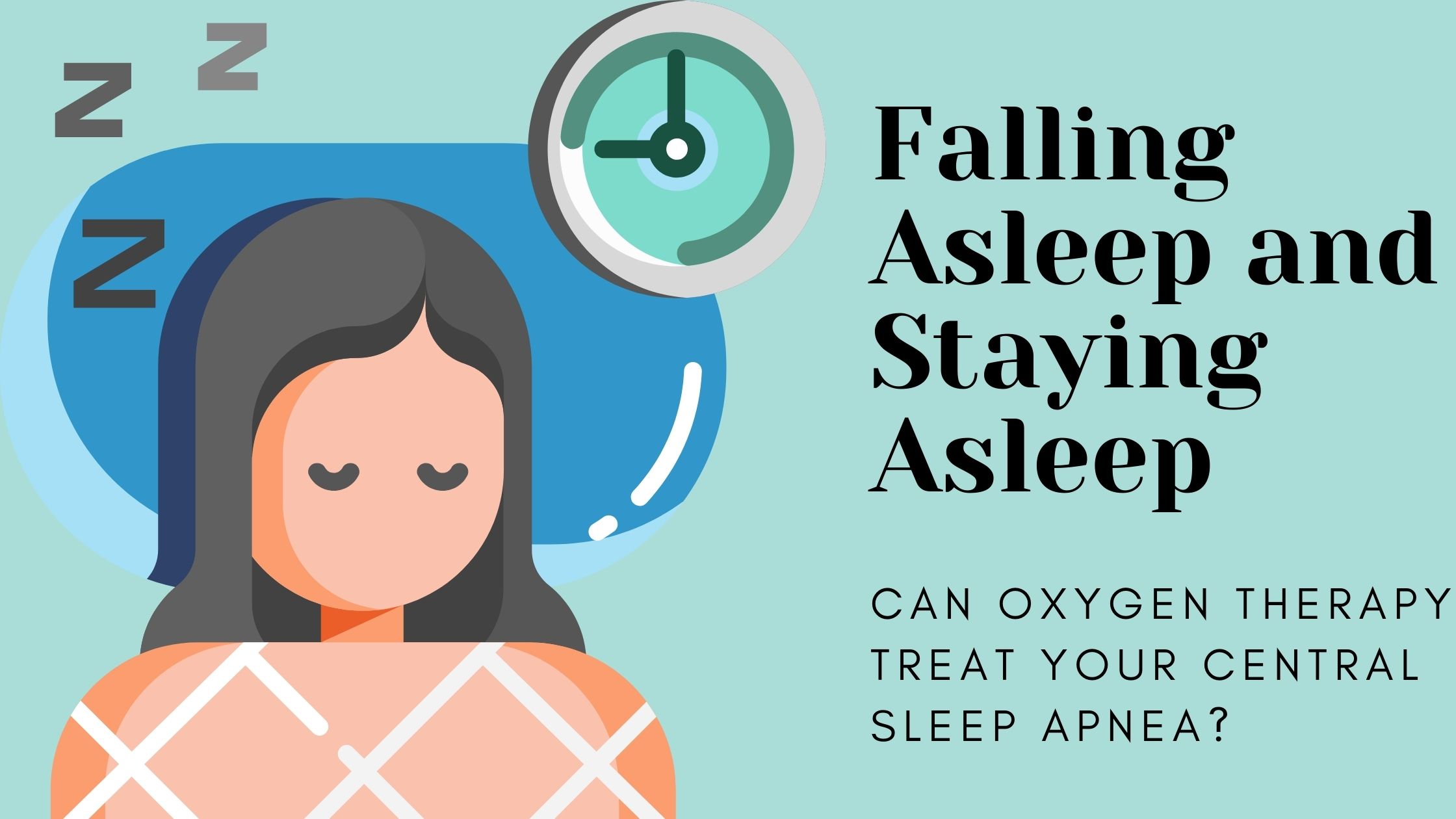
Getting enough sleep can help your well being in a number of ways, your mental health, your physical capabilities, and so much more. But if you have sleep apnea, falling asleep, let alone sleeping through the night is an impossible task.
There are many reasons why people have sleep apnea, and understanding why you have sleep apnea is a critical step in treating it. Once you understand the root of the issue and what is causing it, you will be able to actively target the issue and hopefully get back to bed!
In this blog we will discuss why sleep is so important, especially as you get older. We will also talk about sleep apnea diagnosis and the telltale signs that you should talk to your doctor about your sleep. Once you are diagnosed with sleep apnea, you may need to start using a portable oxygen concentrator while you sleep, so we will discuss your oxygen therapy options as well.
7 Reasons Sleep is so Important
![]()
1. Sleep Boosts your Immune System
It is important for your body to get the sleep it needs so that your immune cells are rested and strong to fight off allergies, germs, viruses and whatever aliment comes their way. Avoiding sickness like colds or the flu reduces your chance of ever experiencing a COPD exacerbation. The American Academy of Sleep Medicine suggests that sufficient sleep can also enhance vaccines effectiveness, which is obviously a plus, especially now that the COVID-19 vaccine has been rolled out in the United States, and it is crucial for COPD patients health.
2. More Sleep Will Help Shed the Extra Weight
Getting a full eight hours of sleep doesn’t mean you will wake up and lose the weight you need to, but sleeping can help your body from packing on extra pounds. Without sleep, your body produces something called ghrelin, a hormone that will boost your appetite, not great if you want to lose weight. Without sleep your body also will not produce leptin, a hormone that helps you realize that you are full, also not great for loosing weight. Not to mention, stress increases the likelihood that you will stress eat, and you might not have the energy to fight craving if you are stressed and under slept.
3. Sleep Can Strengthen Your Heart

Your heart loves sleep. Lack of sleep can cause your body to release something called cortisol which can lead to high blood pressure and heart attacks. Cortisol is a stress hormone that triggers your heart to work harder. Your heart also needs rest to function properly.
4. Better Sleep Means a Happier You
Good sleeping can lead to good moods. Simply waking up feeling rested helps your energy levels soar. This gives you energy to deal with whatever life throws at you, or it at least helps you deal with the obstacles and challenges in everyday life. Having the ability and energy to manage and deal with your emotions will help focus on the happier emotions.
5. Sleeping Can Increase Productivity

Getting enough sleep cultivates a healthy attention span and promotes concentration. Sleep also helps several other aspects of thinking including memory, problem-solving, creativity, emotional processing, and judgment, all of which promote success at work!
7. Sleep Can Increase Exercise Performance
Exercise is essential if you have COPD. Exercise promotes your lung and muscle capacity so you are able to do more everyday activities and tasks, and it also helps to slow down the progression of your COPD. Sleep is a form of exercise recovery, and recovery helps your hand-eye coordination, reaction time and muscle recovery. Plus, depriving yourself of sleep can have a negative impact on your energy level, and decrease your strength and power, both of which you will need to have a healthy COPD exercise regime.

When Should You Talk to Your Doctor About your Sleep
You should talk to your doctor about your sleep if you are not sleeping through the night on a consistent basis. If your lack of sleep is affecting your life while you are awake, you should contact your doctor to set up an evaluation. Your doctor will look at your signs, symptoms, and a sleep history. If you have a partner who shares a bed with you, their insight into your sleeping patterns could be helpful to know!

From there, you could be referred to a sleep disorder center. A sleep specialist can determine your need for further evaluation.
Diagnosing Sleep Apnea

To diagnose sleep apnea test will be conducted:
Nocturnal polysomnography is a test where you will be hooked up to equipment that monitors your heart, lung and brain activity, breathing patterns, arm and leg movements, and blood oxygen levels while you sleep.
Home sleep tests provide you with tools to diagnose sleep apnea at home. These tests usually measure your heart rate, blood oxygen level, airflow and breathing patterns.
Based on the results of these tests and how abnormal they are, your doctor might be able to prescribe a therapy without further testing. However, these tests do not always doesn't detect all cases of sleep apnea, and if your results are normal, your doctor might still recommend polysomnography to understand your sleeping condition further.
If you have obstructive sleep apnea, you may have to go see an ear, nose and throat doctor to rule out blockage in your nose or throat.
However it is more likely that you have central sleep apnea because this is much more common, and if you have COPD it is likely that your sleep apnea can be tied to your respiratory condition.
Tips and Tricks for Sleeping Better if you have Central Sleep Apnea

People with chronic obstructive pulmonary disease (COPD) face distinct challenges getting enough sleep. COPD symptoms including coughing, pain and shortness of breath, all make it difficult to sleep. But as we mention in the section above, sleep is essential for COPD patients because sleep is important for resting your pulmonary muscles — and for simply functioning at a reasonable capacity.
COPD is not the only reason you are not sleeping well, there could be a number of reasons beyond these symptoms that induce sleeping problems. Understanding what these reasons are could help you find your way to a better night’s sleep.
Cut out mid day coffee or tea

Even though you may be tired from not resting enough the night before, that afternoon cup of coffee could be keeping you up. Having a cup of coffee or tea may help the afternoon crash problem you experience, but the extra caffeine late in the day could be impacting your ability to fall asleep that night, and that is a very counterproductive cycle.
Cultivate healthy sleeping habits
Make adjustments to your schedule and the ambiance of your bedroom to help improve your sleep. Start by limiting you napping because too much sleep during the day can disrupt regular sleeping patterns at night. Your naps should be no longer than20 minutes, this should help support your much needed night time rest.
![]()
Stick to a routine, this means going to bed and getting up at the same time every day. This will help reinforce natural sleep/wake cycles.
Elevating yourself by sleeping in a slightly upright position helps reduce stress on your lungs. It also can reduce acid reflux symptoms if you have trouble sleeping due to that.
Adjust your lifestyle

Adjusting your lifestyle means creating healthy habits.
First and foremost, if you smoke, get help to quit. Do not let anyone in your home smoke in order to keep your house free of secondhand smoke, dust, and pollutants. Your breathing is directly impacted by what you breathe in and when you inhale smoke, your air passages get smaller, which makes it harder to breathe.
Start an exercise program, you can join a pulmonary rehabilitation course to learn how to exercise effectively and safely. If you have COPD you can often experience drops in oxygen levels at night and in some cases you may need oxygen therapy while you sleep, but to avoid having to get on oxygen therapy, physical activity will help you build up your oxygen supply. Aim for 30 minutes of exercise a day, three times a week.
A sleep diary is very helpful for COPD patients who have trouble sleeping because it reminds you what works and what doesn’t. Write down what you ate that day, medicines you took, and activities for the day and then write down when you went to bed and woke up. Take a look at it after a few days and you will be able to see what helps you sleep better.

Getting ready for bed prepares you for sleep, even if you are not tired yet, start doing your bedtime routine at the same time every night, this will remind your body that it is time to start relaxing. Try these tips for relaxation:
- Take a warm bath to help your body reach a nice temperature for rest
- Journal or write a to-do list for the next day to clear your mind
- Relax your muscles with light stretching
- Listen to soothing music or a hypnosis recording
- Shut off your electronic devices an hour before bed
- Create a comfortable and cool space with a temperature between 60-71 F.
- Get rid of clutter as it can cause stress
- Aromatherapy with lavender can make it easier to fall asleep
Your sleep position is very important in terms of your lung capacity. Having a good sleeping posture helps open your airways making it easier to breathe. Sleep with your head slightly higher than the rest of your body rather than laying your head completely flat. If you sleep on your side, place a pillow between your knees and keep your back straight. When you sleep on your back, bend your knees slightly with a pillow placed under them.
Sleeping with an Oxygen Concentrator

Sleeping with a portable oxygen concentrator is something you will have to get used to doing. Your breathing pattern changes while you sleep, and you may breathe deeper when you sleep, or it is possible you have a shallower breathing pattern. That is why, if you use oxygen therapy while sleeping, your nighttime oxygen solution may differ from what you use for supplemental oxygen during the day.
Pulse dose portable concentrators can be an effective nighttime solution for some patients, and you can check with your doctor if your pulse flow device is sufficient in ensuring you have adequate blood oxygen levels while sleeping. But your doctor might determine your specific needs require a continuous flow portable oxygen concentrator. Your doctor will be able to perform a series of tests and studies in order to determine exactly what flow-setting you’ll need while you sleep, allowing you to choose your nighttime oxygen machine accordingly.

Once you know what nighttime oxygen machine you need, you can call 1(800)-946-1201 to speak with a respiratory specialist at LPT Medical. We will help you get the device that will cover your oxygen needs at the best possible price.

There are several portable oxygen options to choose from. If you have trouble sleeping, you can look into specific portable oxygen units that have certain features that make them better suited for overnight use. As long as they meet your prescribed oxygen needs, the concentrators discussed here are ideal for your nighttime oxygen solutions.
Best Pulse Flow and Continuous Flow Oxygen Concentrators for Sleeping in 2021

The Respironics SimplyGo is the most flexible option for you in order to satisfy both daytime and nighttime oxygen demands. This device was engineered with your travel needs in mind, so it comes equipped with three modes of oxygen delivery – Continuous Flow Mode, Pulse Mode, and Sleep Mode!
The SimplyGo can run off power from a wall outlet, a cigarette lighter or a charged battery, so you can transport your device with you anywhere. This is the most popular oxygen solution for those that who use sleep therapy equipment, such as a CPAP machine, in conjunction with oxygen.
The SimplyGo is ideal for your 24/7 usage and with its advanced ‘Sleep Mode’ technology you will be delivered a pulse dose of oxygen for a longer duration for a comfortable sleep. If you begin to breathe shallowly or through your mouth, the SimplyGo will automatically switch to the continuous flow mode, and deliver oxygen at 2 LPM to ensure you are adequately oxygenated.
This is something oxygen tanks and canisters will never have the capacity to do. This feature gives you peace of mind that you are being oxygenated throughout the night and getting better sleep for an overall better life.
Here are the SimplyGo specs:
- Pulse Settings: 1 to 6
- Continuous Liter Flow: 0.5 to 2 LPM
- Battery life: Up to 3 hours (on the setting of 2)
- Weight: 10 lbs (with battery included)
- Dimensions: 11.5 W x 10 H x 6 D (inches)
The Inogen One G5 may be a good option for your nighttime use if you are prescribed nighttime supplemental oxygen and approved pulse dose delivery. This is a smaller and lighter machine conducive to an active person’s lifestyle, or simply designed with ease and comfort in mind. The Inogen One G5 weighs 4.8 lbs and will give you 13 hours of pulse dose oxygen when paired with a 16-cell One G5 battery.

Beyond the benefits of its small and compact design, long lasting battery life, and powerful pulse flow settings, is the benefit of owning an oxygen device that provides extremely quiet operation, rated at 38 decibels. That means it won’t disturb you or anyone around you, while you’re asleep.
Here are Inogen One G5 Specs:
- Pulse Settings: 1 to 6
- Battery life: Up to 6 hr 30 min (with single battery)
- Weight: 4.8 lbs (with single battery)
- Dimensions: 3.26 x 8.15 x 7.19 (W x H x D in inches, with single battery)
Overview
The bottom line: you need to sleep well. Sleep is your beginning and the end of each day, so it is a massive part of your life and it should be treated as such, and pay mind to it. If you have trouble sleeping, speak to your doctor about steps you should take to sleep better. People who get less sleep tend to be heavier and are more likely to be diabetic. On top of that they are less energetic, experience bad moods, and lower productivity.

There are so many ways that you can get into a healthier rhythm of sleep, but if you have central sleep apnea, you will need to take added measures to start sleeping again beyond changing your daily habits and creating a sleep routine.
It may be necessary for you to go on oxygen at night. If so, you can get set up with a portable oxygen concentrator that is approved for nighttime use by calling 1(800)-946-1201.


.png)





